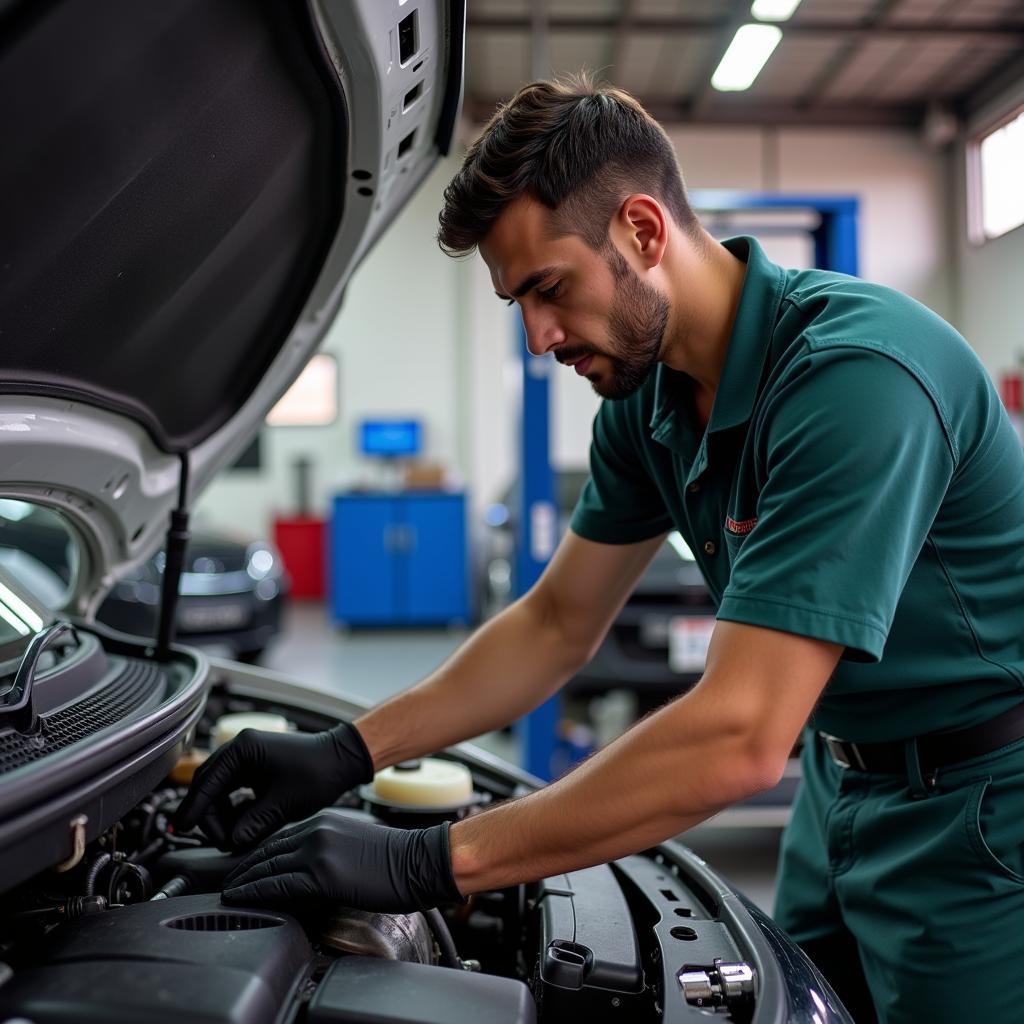A dead battery is often the first sign of a car alternator not charging. This comprehensive guide will walk you through diagnosing and fixing this common car problem, whether you’re a DIY enthusiast or prefer to take it to a mechanic. We’ll cover everything from basic checks to more complex repairs.
Understanding the Car Alternator and Its Function
The alternator is the heart of your car’s electrical system. It generates the power needed to run everything from the headlights to the radio, and, most importantly, it recharges the battery after starting the engine. If your alternator isn’t charging, you’ll soon find yourself stranded with a dead battery.
A failing alternator can manifest in several ways, including dimming headlights, flickering dashboard lights, a dead battery, or even a whining noise coming from under the hood. Ignoring these signs can lead to more significant problems down the road.
Why is My Car Alternator Not Charging?
Several issues can cause a car alternator not charging problem. These range from simple loose connections to more complex internal alternator failures. Identifying the root cause is crucial for effective repair.
- Loose or Corroded Connections: Sometimes, the problem is as simple as a loose or corroded battery cable or alternator connection.
- Faulty Voltage Regulator: The voltage regulator controls the output of the alternator. If it fails, the alternator might overcharge or undercharge the battery.
- Worn-out Brushes: The brushes inside the alternator transfer power from the rotor to the stator. Over time, these brushes wear down and need replacing.
- Bad Diodes in the Rectifier Bridge: The rectifier bridge converts the alternator’s AC output to DC, which the car’s electrical system uses. Bad diodes can prevent the alternator from charging properly.
- Damaged Stator or Rotor: Damage to these core components can significantly impact the alternator’s ability to generate power.
Having trouble with your car horn? Check out this guide on how to fix a car horn.
How to Fix a Car Alternator Not Charging
Before diving into repairs, safety first! Always disconnect the negative battery cable before working on any electrical components.
- Inspect the Battery and Cables: Check for loose or corroded connections. Clean any corrosion and tighten all connections.
- Test the Battery: Use a multimeter to check the battery voltage. A healthy battery should read around 12.6 volts.
- Test the Alternator: With the engine running, measure the voltage across the battery terminals. A properly functioning alternator should output between 13.5 and 14.5 volts.
- Check the Drive Belt: Ensure the alternator drive belt is tight and in good condition. A loose or worn belt can prevent the alternator from spinning properly.
- Test the Voltage Regulator: This requires a bit more expertise. You can use a multimeter to test the voltage regulator’s output, or you can take your car to a mechanic for testing.
If you suspect the alternator itself is faulty, consider replacing it. You can purchase a new or remanufactured alternator. If you’re not comfortable working on your car’s electrical system, it’s best to can i sue my mechanic for not fixing my car.
“A simple visual inspection can often reveal the culprit behind a non-charging alternator,” says John Smith, a seasoned automotive electrician with over 20 years of experience. “Loose connections or a worn drive belt are often overlooked but easy to fix.”
How Much Does it Cost to Fix a Car Alternator Not Charging?
The cost to fix a car alternator not charging varies depending on the underlying issue. A simple repair, like tightening a loose connection, might be free. Replacing the alternator can cost anywhere from $200 to $800, including parts and labor. Need to fix a dent? Check out our guide on how much to fix small dent in car uk. Or, if you’re dealing with car horn issues specifically on a Ford Ranger, this guide on how to fix a car horn ford ranger 2003 might be helpful. If you’re concerned about car horn repair costs, see our article on how much does it cost to fix your car horn.
“Remember to consider the cost of diagnosis when budgeting for alternator repairs,” advises Maria Garcia, a certified mechanic and automotive instructor. “A thorough diagnostic check can save you money in the long run by pinpointing the exact problem.”
Conclusion
Fixing a car alternator not charging is often within the reach of a DIY enthusiast. However, if you’re unsure about any step, it’s always best to consult a qualified mechanic. Ignoring a faulty alternator can lead to a dead battery and leave you stranded. We hope this guide has provided you with the information you need to get your car back on the road. For further assistance or inquiries, connect with AutoTipPro at +1 (641) 206-8880 or visit our office at 500 N St Mary’s St, San Antonio, TX 78205, United States.





Leave a Reply